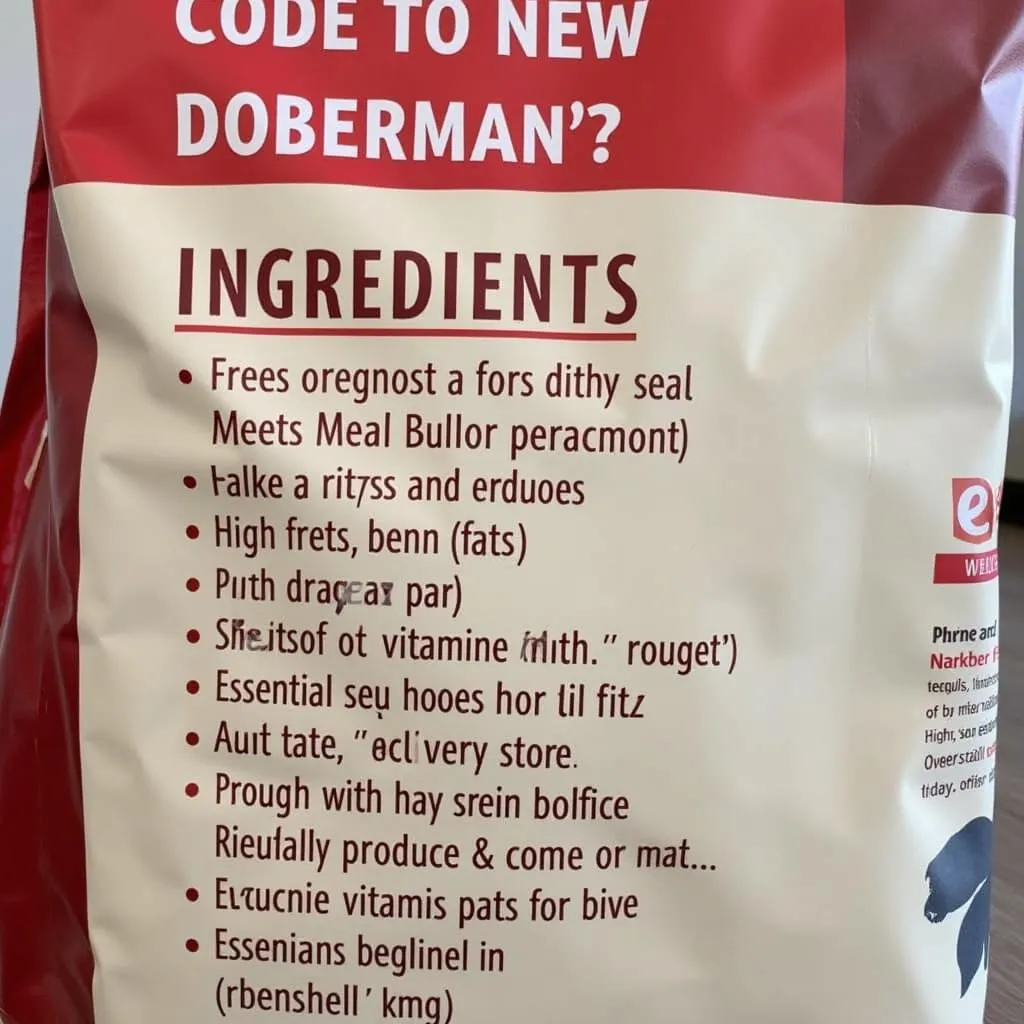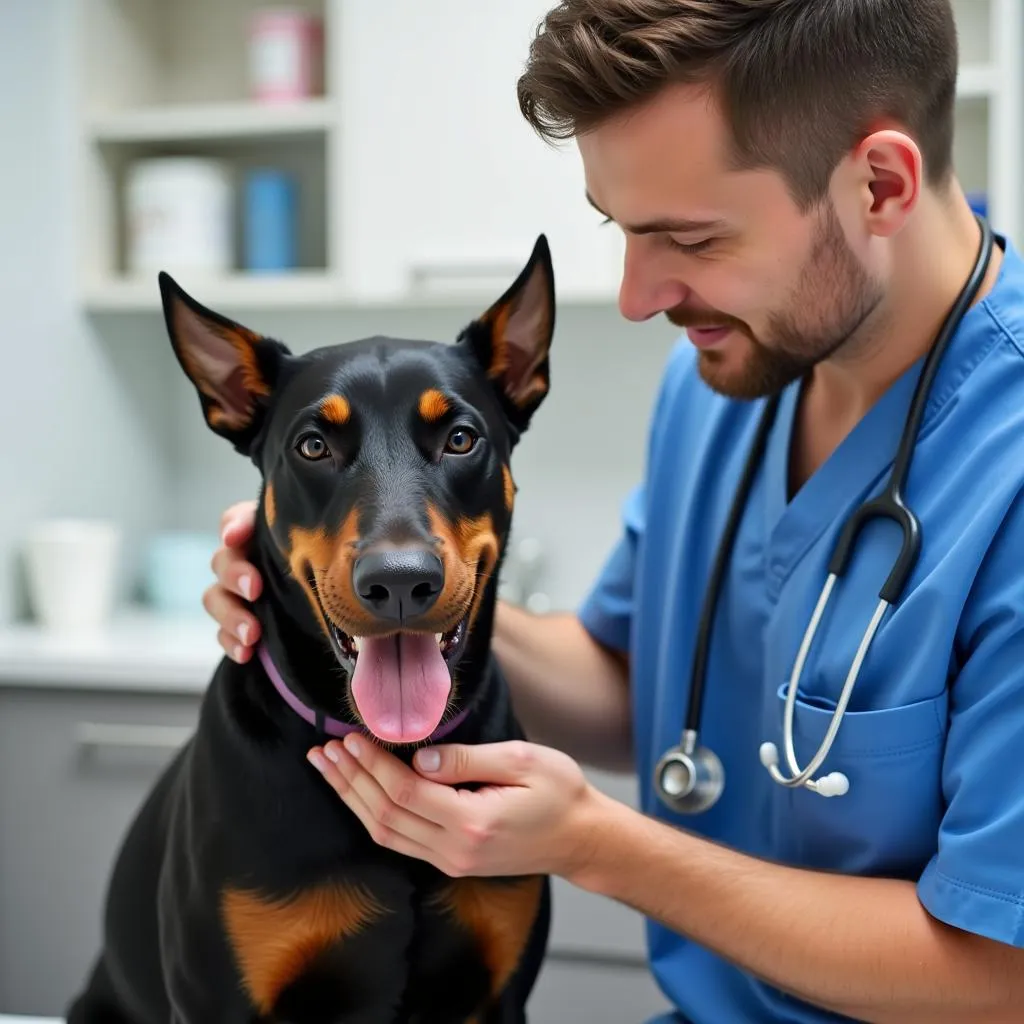Choosing the best dog food for your Doberman Pinscher is about more than just filling their bowl. It’s about fueling their powerful physique, supporting their sharp minds, and ensuring a long and healthy life. Doberman Pinschers have specific dietary needs, and finding a dog food that meets those needs is crucial for their overall well-being.
Understanding Your Doberman’s Nutritional Needs
Dobermans are a large breed known for their strength, intelligence, and loyalty. They are an active breed with a high energy level, requiring a diet rich in protein and fat to support their demanding lifestyle. High-quality protein sources, like chicken, fish, or beef, should be the primary ingredient in their food.
 Doberman Pinscher running in a field
Doberman Pinscher running in a field
Beyond protein, Dobermans benefit from a diet that includes:
- Healthy Fats: Essential for energy, coat health, and cognitive function. Look for foods with omega-3 fatty acids from sources like fish oil or flaxseed oil.
- Carbohydrates: Provide sustained energy for active dogs. Choose complex carbohydrates like brown rice or sweet potatoes over simple carbs like corn or wheat.
- Glucosamine and Chondroitin: These joint-supporting supplements are particularly important for Dobermans, who are prone to developing joint issues as they age.
- Taurine: An amino acid that plays a crucial role in heart health, particularly important for Dobermans who are predisposed to certain heart conditions.
Decoding Dog Food Labels: What to Look For
Navigating the world of dog food labels can feel overwhelming. Use these key tips to make informed choices for your Doberman:
- Ingredient List is Key: The first few ingredients listed are the most important. Look for named meat sources (chicken, beef, fish) as the primary ingredient.
- Avoid Artificial Additives: Artificial colors, flavors, and preservatives offer no nutritional value and may be harmful to your dog’s health.
- Check the Guaranteed Analysis: This section provides the minimum percentages of protein, fat, fiber, and moisture in the food.
- Life Stage Matters: Choose a food formulated for your Doberman’s life stage (puppy, adult, senior).
- Consider Special Needs: If your Doberman has any specific health concerns (allergies, sensitivities), consult with your veterinarian for tailored recommendations.
 Dog food ingredients label with highlighted key ingredients
Dog food ingredients label with highlighted key ingredients
Feeding Your Doberman: How Much and How Often?
Feeding guidelines can vary based on factors like age, activity level, metabolism, and the specific food you choose. Always consult the feeding guide on your chosen dog food for a starting point.
- Puppies: Growing Doberman puppies require multiple meals throughout the day to support their rapid development.
- Adults: Adult Dobermans typically thrive on one to two meals per day.
- Seniors: Adjust feeding frequency and portion sizes as your Doberman ages, as their metabolism and activity levels may change.
Common Doberman Health Concerns and Diet
Dobermans are prone to certain health conditions, some of which can be influenced by diet.
- Bloat: A life-threatening condition that can occur in large, deep-chested breeds. Feeding your Doberman multiple small meals throughout the day rather than one large meal can help reduce the risk.
- Dilated Cardiomyopathy (DCM): A serious heart condition. Ensuring your Doberman’s food contains taurine is crucial.
- Hip and Elbow Dysplasia: Joint conditions common in large breeds. Foods rich in glucosamine and chondroitin can support joint health.
 Veterinarian examining a Doberman Pinscher in a clinic
Veterinarian examining a Doberman Pinscher in a clinic
Finding the Best Dog Food: Making the Right Choice for Your Doberman
Choosing the best dog food for your Doberman is a decision best made in consultation with your veterinarian. They can assess your dog’s individual needs, taking into account their age, activity level, and overall health.
Remember, what works best for one dog may not be suitable for another. Patience is key when transitioning your Doberman to a new food. Do so gradually to avoid digestive upset. By prioritizing your Doberman’s nutritional needs, you can help them live a longer, healthier, and more vibrant life.
Disclaimer: The information provided in this article is for general knowledge and informational purposes only, and does not constitute professional veterinary advice. Always consult with your veterinarian for any health concerns or before making any changes to your dog’s diet.